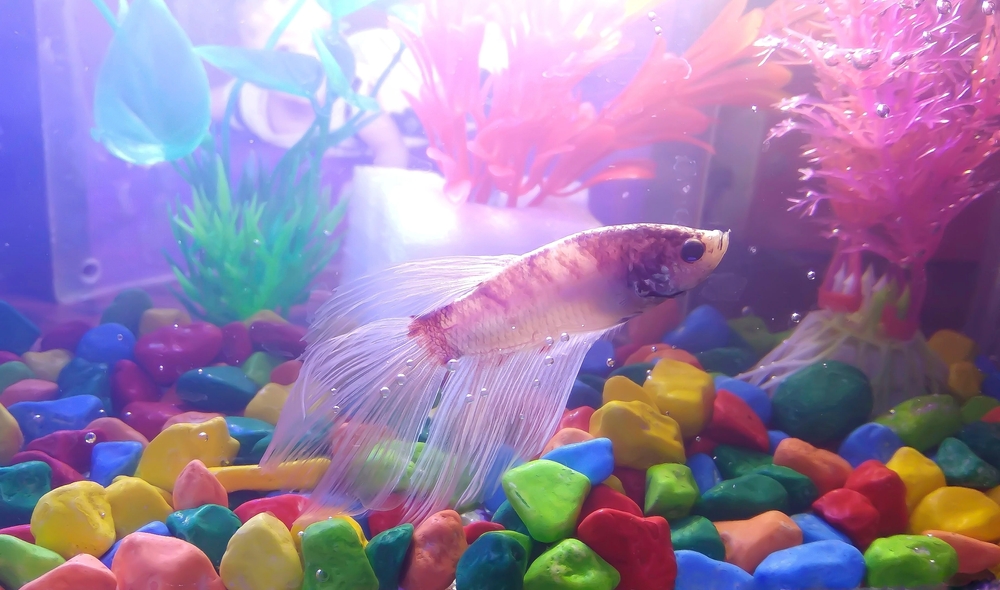When starting a betta aquarium, many obvious considerations come to mind. What do you feed the betta? What kind of tank do you buy? What type of decor should you use? But there is one important factor you may not initially consider, especially if you’re a new aquarist: lighting arrangements.
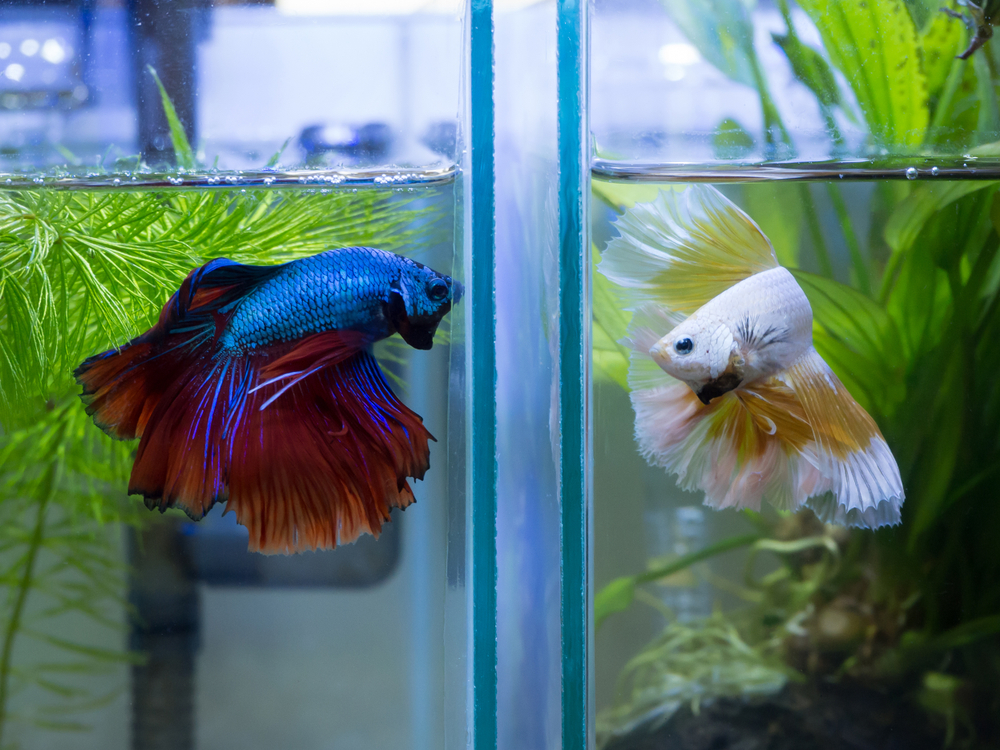
Special lighting for your aquarium may initially seem like an aesthetic and optional thing, making you wonder if you should even bother with it. But make no mistake about it: lighting is a vital factor that can affect the health and well-being of your betta. Read on as we explore the impact of this factor, the different lighting options, and how to choose the proper one.
Keep your betta friend happy and healthy with these other crucial tips:
- How to Keep a Betta Fish Happy
- Why Is My Betta Flaring at Nothing?
- How to Keep Betta Fish Warm Without a Heater
Contents
Understanding Betta Fish Anatomy and Vision
The first step to knowing how to approach aquarium lighting for betta fish is understanding the fish. Specifically, you need to know a bit about betta fish anatomy, in this case, how their vision works.
Did you know that betta fish have monocular vision? It means they can see different images in each eye, allowing them a wider field of view for detecting prey and predators. But that’s not the only interesting fact about how your betta sees the world.
Betta fish also have a system of sense organs called the lateral line, which they share with many other fish species. The lateral line allows them to detect movement and vibration in the water around them, further aiding their spatial awareness.
Why a lateral line, though? One possible reason may be the betta fish’s natural habitat. All the light that reaches the water is filtered through an overhead canopy of plants, thus creating subdued lighting under the water.
This can add to the fish’s limitations in sight (bettas are also quite nearsighted) and make it a bit harder to see in the environment. A set of organs that allow you to detect vibrations in your surroundings compensates reasonably well for all these.
The takeaway? When adding lights to your betta fish tank, you should consider the lighting conditions to which betta eyes are adapted.
Lighting Essentials for Betta Fish
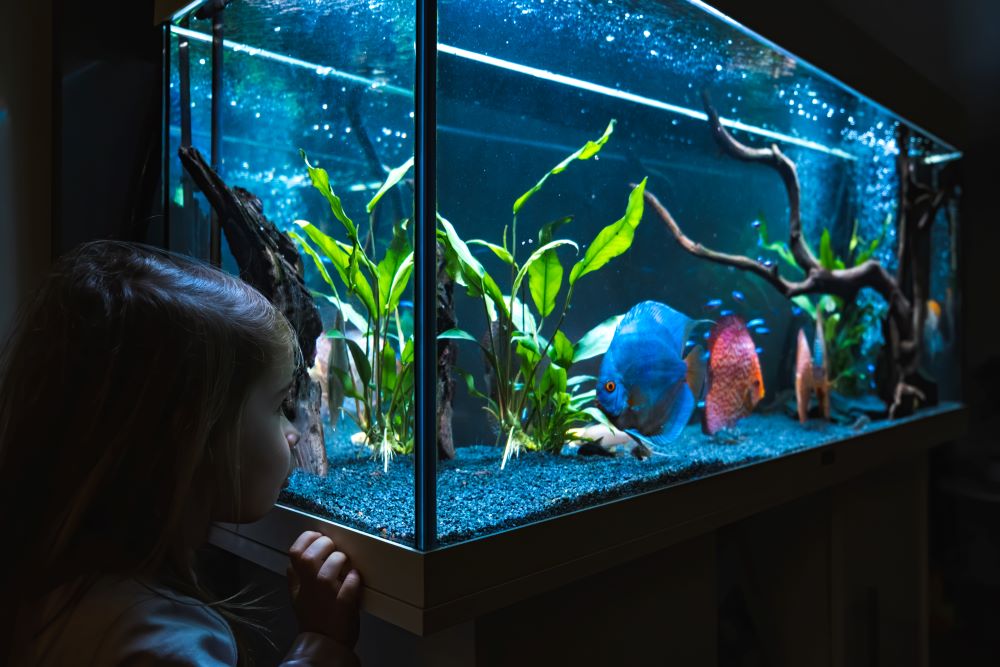
Having understood how betta fish see, let’s talk about the proper lighting for a betta aquarium, beginning with how it actually affects them.
Role of Light in Betta Fish Tanks
The primary role of light in a betta fish tank is to enable the fish to see. It also plays a secondary but just as vital role in simulating their natural habitat, where they are the most comfortable. In that habitat, these fish follow a stable day/night cycle, from sleeping to waking hours, and light is vital to maintaining that cycle.
Still, the betta is not the only one to benefit from good lighting. The plants you will ideally place in the tank also need sunlight to grow and remain healthy. This makes it doubly important to light your betta tank properly.
Types of Aquarium Lighting
It’s one thing to understand the importance of lighting in your betta aquarium; it’s another to know which ones to choose. So, what’s the best lighting to choose? When picking a light for your aquarium, you want one that’s energy-efficient, producing enough light without excessive heat that could be unhealthy for the aquarium occupant.
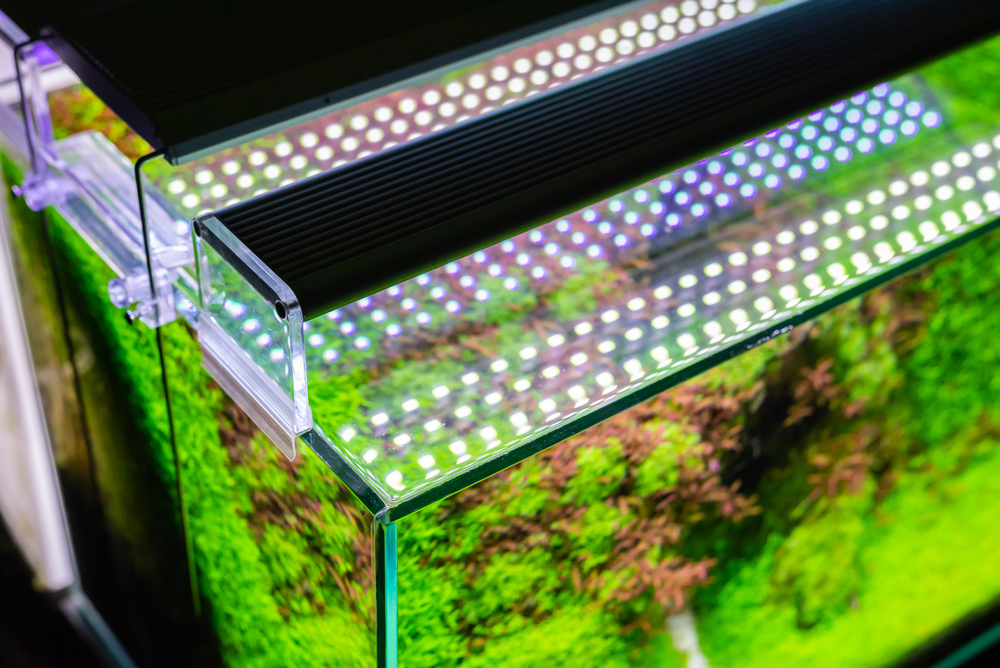
LED aquarium lights are the most recommended option regarding this specification. Specifically, you should try full-spectrum LED lights. Natural sunlight, or any suitable alternative, is essential not just for your betta but also for the plants, and full-spectrum lights are as close as they get to that type of light.
Setting Up Your Light System
Another vital part of simulating your betta fish’s natural habitat concerning lighting is the setup. To ensure the best results, try using a timer to automate the tank’s lighting system and ensure consistency. Providing 8-10 hours of darkness each night is essential, which means turning the tank lights off to give your betta time to rest.
If you can’t automate it, you may have to maintain the cycle manually. But whether manually or automatically, maintaining this balance between light and dark will ensure your betta is comfy and thriving.
Benefits of Proper Lighting
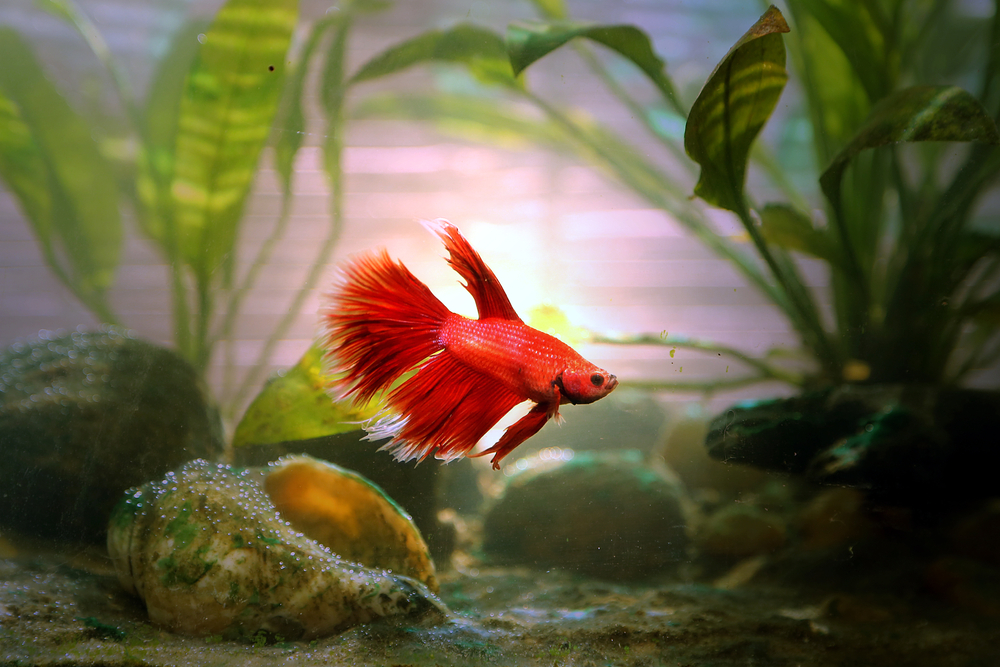
We’ve already mentioned a few benefits of good lighting for your betta. But we’ve not been exceptionally detailed about that so far, so let’s explore these benefits a little more in this section. Specifically, we’ll overview the benefits to the betta, the plants, and the tank water.
Regulating Betta Fish Sleep Cycles
Like ours, a betta fish’s internal clock or circadian rhythm relies on the natural day and night cycle to regulate its sleep patterns. Adequate light exposure is, therefore, critical for maintaining this rhythm.
By simulating a consistent light-dark cycle, you enable your betta to distinguish between day, which is for activity, and night, for rest. This cycle should not exceed 14-16 hours of light to prevent stress and ensure they receive the required rest.
Effects on Plant Growth
Plant growth is integral to a balanced ecosystem in any aquarium, and light is essential to that growth. The light is not as crucial if you are not using live plants.
However, if you use live plants (which I’d highly recommend), you should keep in mind that those need light to perform photosynthesis and grow. Without it, their health and, subsequently, that of the entire tank could suffer. Two main factors are important here:
- Light Duration: 8-12 hours of light supports robust plant growth without promoting excessive algae growth.
- Light Intensity: Most aquatic plants need moderate to high lighting, aiding oxygen production and filtration.
Lighting and Water Quality
Lighting is not only for visual appeal but also impacts the water quality and, by extension, the well-being of your betta. For example, excessive light, especially when paired with loose nutrients in the water, can lead to excessive algae growth. Conversely, well-managed lighting helps regulate the tank’s biological processes and curb such excessive algae growth.
Lighting Timers and Schedules
Manually regulating the lighting pattern in your betta tank is exhausting—at least, unless you actively enjoy it. Still, even with the enjoyment, you can’t always have the time to drop by for lighting control, which is why automating the whole thing with timers is necessary.
It’s not just about having a timer, though; it’s also about having a reliable one. Here are the essential factors to consider when selecting a timer:
- Ease of use: Look for timers that are easy to program.
- Compatibility: Ensure the timer is compatible with your lighting system.
- Battery backup: In case of a power outage, a timer with battery backup will keep the schedule intact.
Using a reliable timer for your aquarium lighting lets you provide your betta with a stable day and night cycle by reliably and precisely controlling the light schedule.
For instance, I’ve found that a digital timer with multiple daily settings is great for creating a varied lighting routine that closely matches the natural rise and fall of the sun without the need to drop in all the time.
Health and Safety Concerns
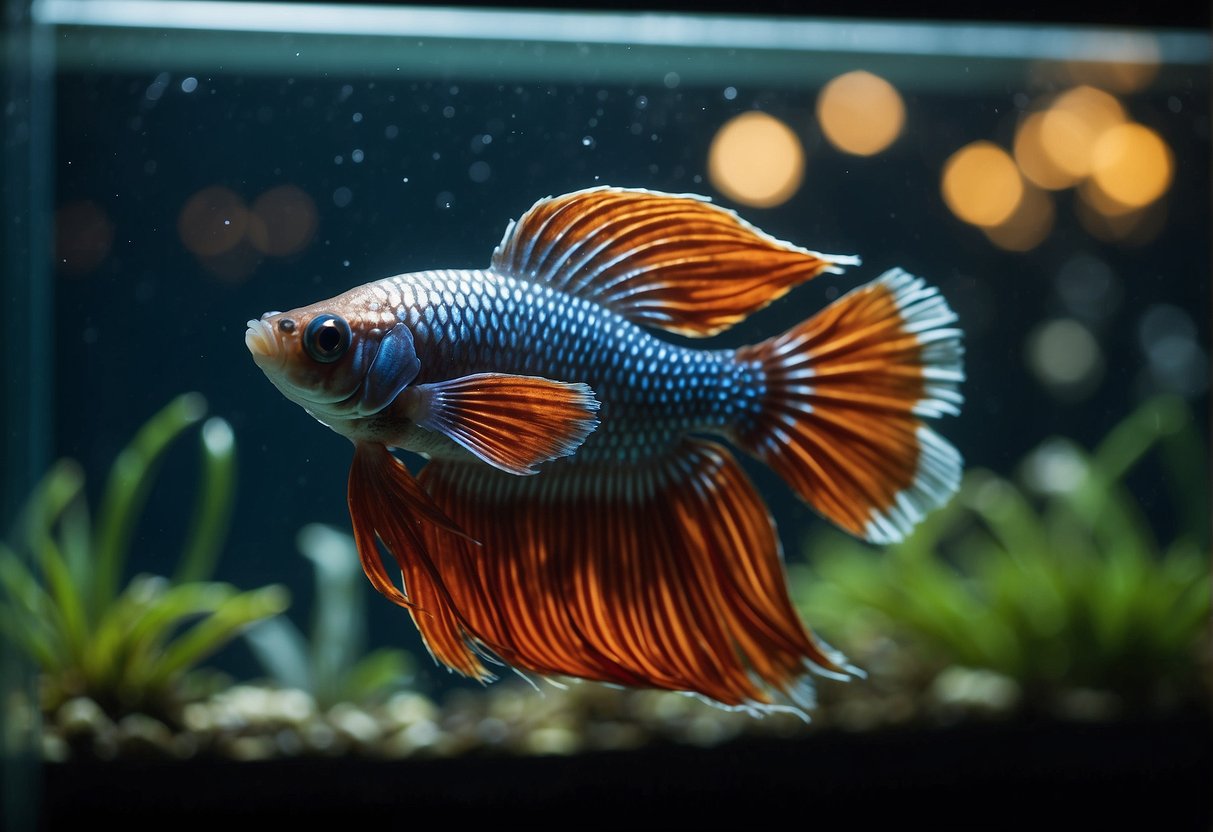
Earlier, we mentioned that your fish tank lighting arrangement can impact your betta by making its surroundings more visible, thus ensuring its comfort. But did you know that light can also directly affect your betta physically and psychologically? Let’s talk about two ways the tank lighting can get your betta fired up the wrong way and how to prevent them.
Preventing Overstimulation and Stress
Betta fish are susceptible to mental overstimulation from prolonged light exposure, which can lead to stress. While sufficient quantities of natural light can also cause this, it most often happens with artificial light.
This stress may show as a loss of color, reduced activity, or a diminished appetite. To prevent such problems, you need to stick to 14-16 hours of moderate light and 8-10 hours of darkness, echoing their natural habit.
Avoiding Temperature Fluctuations
It’s vital for bettas to live in a stable environment, and dramatic changes in lighting can unexpectedly alter the temperatures inside the tank. This can lead to temperature shock, which doesn’t bode well for your betta’s health. To keep such temperature-related issues at bay, you should monitor the tank to ensure it stays within the ideal range of 76°F to 80°F.
Frequently Asked Questions
In this part, we’ll tackle common questions about lighting in betta fish tanks and help you understand how lighting affects your fish’s health and behavior.
What type of lighting is best for a betta fish tank?
For betta fish tanks, a light that replicates the natural light cycle and intensity is ideal. Lights specifically designed for aquariums that offer a spectrum similar to natural sunlight are often recommended. Using such lighting options can help promote the well-being of betta fish.
Is it essential to have a light on for bettas during daytime hours?
Yes, it’s important for betta fish to maintain a consistent day/night cycle, as it influences their biological clock. Most bettas thrive with around 14-16 hours of light each day, followed by a period of darkness to simulate their natural environment.
Can I use LED lights in my betta fish aquarium, and are they beneficial?
LED lights are suitable for betta fish aquariums and come with benefits such as energy efficiency and long life. Moreover, they generate less heat and allow for customization of lighting conditions suitable for bettas.
How does continuous lighting affect the health of a betta fish?
Continuous lighting can disrupt a betta fish’s sleep patterns, leading to stress and other health issues. Betta fish need a period of darkness to rest, and consistent light cycles are vital for their overall health and well-being.
Are bettas able to live in a tank without any artificial lighting?
Betta fish can survive without artificial lighting if there is ample ambient light to establish a regular day/night cycle. However, without sufficient lighting, their natural behaviors and health may be impacted.
Do betta fish exhibit a preference for either a well-lit or darkened environment?
Bettas don’t have a preference per se, but they require a balance. They need a well-lit environment during the day and a darkened environment at night to mimic the light cycle they would experience in the wild. This balance supports their health and mimics their natural living conditions.

Ian Sterling, founder of Fishlab.com, began his aquarium journey over 30 years ago, driven by a deep fascination for fish and their diverse personalities. His website, Fishlab.com, is dedicated to making fishkeeping accessible and enjoyable, offering beginner-friendly guidance, expert insights, and a community for aquarists to connect and share experiences.


